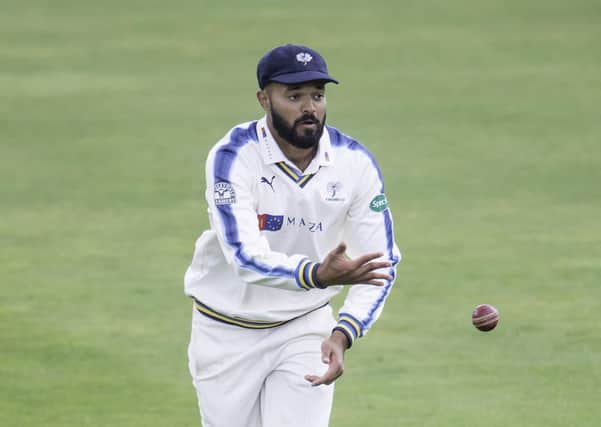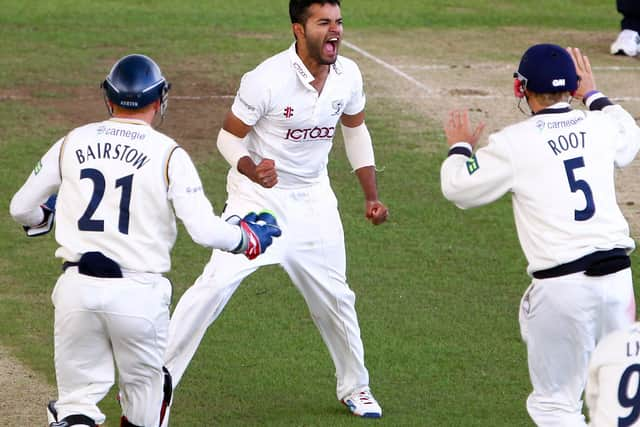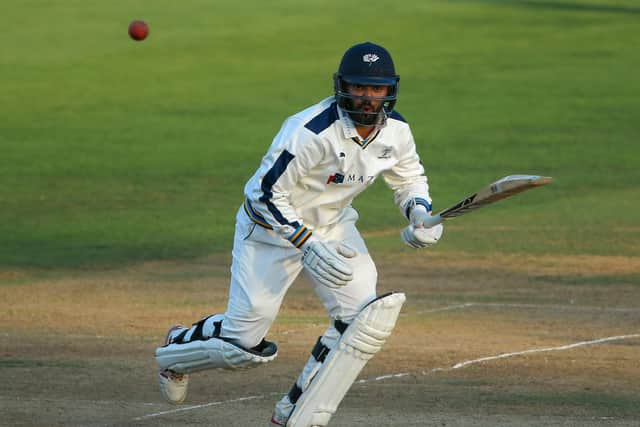Azeem Rafiq: Full statement from Yorkshire CCC on Rafiq racism investigation


“There is no place for racism in cricket. There is no place for racism in the Yorkshire County Cricket Club.
“In September 2020, the Club received a number of allegations of racism made by former player Azeem Rafiq spanning back to 2008. The Club launched a full investigation which was conducted by international law firm Squire Patton Boggs. The Club also appointed an independent Panel of experts chaired by Dr Samir Pathak. The Panel’s role was to oversee the integrity of the investigation, make their own findings and propose recommendations to the Club.


Advertisement
Hide AdAdvertisement
Hide AdThe report and recommendations were delivered to the Board on 13 August 2021 and since then the Board and its executives have been considering the report and its recommendations and taking legal advice upon them. The Club has been advised of its responsibilities in relation to privacy law and defamation and as such, is not able to publish the full report. Although our clear legal advice is that the full report should not be made public, the Club has instructed counsel to assist it inproducing a summary of the report and recommendations which is attached to this statement.
The report shows that there were in excess of 40 allegations made against the Club by Azeem Rafiq. The majority were not upheld, and some were not upheld on the grounds that there was insufficient evidence. However, seven of Azeem Rafiq’s allegations were upheld. There is no question that Azeem Rafiq, during his first spell as a player at YCCC, was the victim of racial harassment. He was also subsequently the victim of bullying.
On behalf of all at YCCC, I wish to extend my sincere, profound and unreserved apologies to Azeem and to his family.
Whilst very many of the allegations made by Azeem have not been upheld we thought it right to be clear about those that were upheld and set out the most salient of those below:


Advertisement
Hide AdAdvertisement
Hide Ad1. When Azeem Rafiq was playing junior cricket for Yorkshire, he was not provided with halal food at matches. This has now been rectified.
2. Prior to 2010 the Panel found that there were three separate incidents of racist language being used by former players which were found to be harassment on the grounds of race.
3. Before 2012 a former coach regularly used racist language.
4. During his second spell at Yorkshire between 2016 and 2018 there were jokes made around religion which made individuals uncomfortable about their religious practices.


Advertisement
Hide AdAdvertisement
Hide Ad5. During his second spell at the Club, a former player made references to Azeem Rafiq’s weight and fitness that amounted to bullying.
6. In August 2018, when Azeem Rafiq raised concerns of racism there was a failure by the Club to follow its own policy or investigate these allegations.
7. Finally, that on a number of occasions prior to 2018 the Club could have done more to make Muslims more welcome within their stadiums and should have dealt better with complaints of racist or anti-social behaviour within those stadiums.
In being honest and direct about the clear failings at the Club that were highlighted in the report we must also be honest and direct about what the report did not say. It determined that there was insufficient evidence to conclude that Yorkshire County Cricket Club is institutionally racist. It did not find that any decisions by the coaching staff or the Club, relating either to Azeem’s inclusion within a team or his ultimate release from the Club was for anything other than cricketing reasons.


Advertisement
Hide AdAdvertisement
Hide AdThere were a great many people at the Club who cared deeply for Azeem and who worked extremely hard over a long period to develop and assist him, both personally and professionally, and who celebrated his successes and championed him at the Club. And there were others that worked exceptionally hard with him on his cricket, particularly when he struggled for form.
Both the current and previous management have worked hard over many years to improve engagement within the diverse communities within Yorkshire. It is a matter of sincere regret that the good work of so many people at the Club - both with Azeem and in our efforts to build an inclusive and welcoming cricket club representing the best of all of Yorkshire - is at risk of being overshadowed by the behaviour and remarks of a few people.
Over 5 million people live within our county boundaries, from diverse and varied backgrounds and communities. They are all welcome at the Club which for a long time has looked to find ways to engage with all cricketing communities and to play our full part in Yorkshire life and sport. The Club established Bradford Park Avenue, whereby the Club is regenerating a first-class cricket ground for the benefit of a predominantly South Asian local community. The Club has also set up the Yorkshire Cricket Foundation, the Club’s charitable arm, which is delivering much needed initiatives into the community. This includes this summer’s CrickEAT, which delivered 12,000 meals to children in the community who needed them. The Club has also played a predominant role in developing and investing in women’s professional cricket at Emerald Headingley Stadium.
The Club had already set up an Equity Diversity and Inclusion Committee and is the first county to appoint a full time EDI Manager. The Club understands that these have been the first steps on a long and important journey.
Advertisement
Hide AdAdvertisement
Hide AdLooking to the future, the Club will now enthusiastically implement the Panel’s recommendations and will look to work with a broader group from diverse communities to further develop and improve our inclusivity, accessibility and sensitivity to the pulse of modern Britain. We also commit to giving regular updates on our plans and our progress. We should be judged on this over the coming months and will report on our progress at our Annual General Meeting in the Spring.
I am confident the responsible way that the report has been received by the whole Club, together with the clear and collective determination to enthusiastically embrace its recommendations, is an important moment in our journey to become more thoughtful, more inclusive and to make sure that every aspect of the Club fully lives up to the spirit of the great game of cricket.
SUMMARY OF THE REPORT OF AN INDEPENDENT INVESTIGATION INTO COMPLAINTS RAISED BY AZEEM RAFIQ AND RELATED MATTERS
Yorkshire County Cricket Club (“the Club”) appointed an Investigation Panel chaired by Dr Samir Pathak to investigate certain allegations made by Azeem Rafiq and to consider the extent to which the Club was allegedly institutionally racist. The Club’s Board gave the Panel delegated powers to instruct Squire Patton Boggs (UK) LLP (“the Team”) to conduct the independent investigation.
Advertisement
Hide AdAdvertisement
Hide AdThe Panel instructed the Team to seek to make findings of fact as to whether Azeem Rafiq suffered racism as alleged and/or generally whether the Club had acted in breach of their Harassment and Bullying policy and/or Equal Opportunities policy and/or Disciplinary Policy and/or the relevant provisions of the Equality Act 2010. The Panel also instructed the Team to present relevant evidence in relation to each of the 43 individual allegations of racism and bullying brought by Azeem Rafiq (together with the allegations of others) to allow the Panel to determine the question of alleged institutional racism.
The Investigation was not an open inquiry into alleged racism in cricket (whether across Yorkshire or more widely). However, where any issues of concern or potential concern on a wider scale arose out of the evidence which the Panel identified, they commented on them. The Team worked extremely hard over a sustained period. It conducted twenty-nine interviews with twenty-six witnesses, received responses to written questionnaires and was provided with evidence by email from additional individuals. Many individuals declined to participate in the Investigation, and this impacted on its ability to make conclusive findings one way or another.
Whilst the process took longer than was hoped, the Panel took the view that it was more important to get it right than to do it quickly.
It is very important to note that this was not a judicial process and the Panel’s views are therefore not judicial views. The Club has been advised by senior counsel that it has a duty of care to all participants and in particular cannot breach laws on privacy or defamation. Accordingly, following the receipt of legal advice, the Club has not published the Panel’s report but produced its own summary of the report and the recommendations which it sets out below.
Advertisement
Hide AdAdvertisement
Hide AdAzeem Rafiq made in excess of 40 separate allegations against YCCC covering the two periods he was employed by the Club and relating to the period after he left. In almost all cases he alleged he was subject to racial harassment or bullying. To understand the findings of the report it is important to understand the tests applied to the questions.
The Panel made three categories of findings, all of which are based on the balance of probabilities test:-
a) Allegation Upheld.
b) Allegation Not Upheld.
c) Allegation Not Upheld on the basis of Insufficient Evidence to say whether the allegation happened as alleged and/or that there is a link to the protected characteristic, but the Panel was not in a position to positively conclude that the allegation did not happen or that it was not linked to the protected characteristic.
AZEEM RAFIQ’S ALLEGATIONS BETWEEN 2002 - 2014
Azeem Rafiq joined the Club’s U12s team in 2002 and graduated to the Academy before signing his first Junior Professional Contract in 2009. In June 2012, Azeem Rafiq was appointed Captain of the Club’s T20 team, becoming the youngest captain in the Club’s history. He was released in 2014.
Advertisement
Hide AdAdvertisement
Hide AdAzeem Rafiq makes approximately 16 separate allegations of discrimination, bullying and harassment relating to this period which include both specific incidents and more general allegations of ongoing discriminatory behaviour during this period.
Of these allegations 12 were not upheld, there was insufficient evidence to determine one but during this period there were three specific allegations which the Panel concluded amounted to racial harassment or bullying. They occurred prior to 2010 and relate to former players using racist language that would amount to harassment.
Azeem Rafiq also made an allegation that prior to 2012 a former coach disliked and verbally attacked him. The Panel did not uphold these allegations but did uphold that the coach used racist and derogatory language in front of Azeem Rafiq.
Included within Azeem Rafiq’s allegations during the first period of his employment at YCCC were a number of allegations relating to the culture at the Club.
Advertisement
Hide AdAdvertisement
Hide AdDuring the first period of his employment Azeem Rafiq alleges there was a culture that made him feel isolated. Azeem Rafiq alleged that there was a drinking culture at the Club, which meant that as a Muslim he was socially excluded and, for a period, ended up drinking alcohol in order to fit in. The Panel further concluded that there was insufficient evidence to suggest that there was an unacceptable drinking culture. The Panel placed significant weight on the evidence of a number of other members of the playing staff, including a Muslim player, who chose not to drink but were not
excluded and did not uphold this allegation.
Azeem Rafiq also makes several allegations during this period that he did not receive sufficient support when he was struggling and alleges that the lack of support was based on race. The Panel found that actually Azeem Rafiq had received significant support during this period and YCCC had endeavoured to assist in protecting and supporting AR’s career. The Panel did note that there were some incidents during this first period which did not show a level of respect for Muslim practices at this time. The Panel notes that these matters have subsequently been addressed.
Azeem Rafiq also alleges that cricketing decisions were made about him by the Club or its coaches on the grounds of race. The Panel did not uphold these allegations and did not find that any
decisions had been made for anything other than cricketing reasons. Sadly, Azeem Rafiq’s form dipped towards the end of this period and he was released by the Club. Azeem Rafiq alleges his form suffered as a result of racism. The Panel did not uphold this allegation. Having reviewed the evidence, the Panel found that the reason for Azeem Rafiq’s release was his loss of form and concluded that Azeem Rafiq was not treated less favourably than any white player would have been in materially the same circumstances.
AZEEM RAFIQ’S ALLEGATIONS BETWEEN 2016-2018
Advertisement
Hide AdAdvertisement
Hide AdThe Panel note that Azeem Rafiq’s return to the Club only two years after he had been released was a remarkable feat and one for which he should rightly take a lot of credit. The fact that he was able to play himself back into contention and into another contract is testament to his strength of character.
Azeem Rafiq relied upon a number of specific examples to demonstrate that he was treated unfairly after he returned to the Club, and that the reason for the unfairness was his race. Azeem Rafiq makes several allegations during this period that he was treated unfairly following his performance on the pitch. The Panel reject two of these allegations and conclude there is insufficient evidence to determine the third.
Azeem Rafiq alleges he was unfairly excluded from games and/or criticised for his performance in games. The Panel did not uphold this allegation and could not ascribe any discriminatory motive or purpose in the Club’s actions when not selecting him.
Azeem Rafiq also made a number of allegations that he was unfairly treated off the pitch during this period. Some of the allegations were not upheld but in respect of others the Panel concluded there was insufficient evidence to make a determination. The Panel did not find that YCCC made any cricketing decisions in relation to Azeem Rafiq based on his race or religion.
Advertisement
Hide AdAdvertisement
Hide AdAzeem Rafiq made three further specific allegations of incidents of racism or bullying during the second period of his employment at the Club. The Panel upheld one of these allegations. The Panel concluded that a former player bullied Azeem Rafiq by way of making references to Azeem Rafiq’s weight and fitness. The Panel concluded that the behaviour was insulting and humiliated Azeem Rafiq, leading him to lose self-esteem. The Panel further found the Club failed to comply with its own Bullying and Harassment Policy. The Panel made it clear that the conduct in question had not been intended to be bullying nor was it racially motivated.
Azeem Rafiq also alleged that during this second period he suffered bullying and racism from a teammate. The Panel did not find Azeem Rafiq’s evidence wholly credible and did not uphold these allegations concluding that both Azeem and the player engaged in friendly verbal attack towards each other, and no malice was intended by either to the other. The Panel concluded that Azeem
Rafiq and his teammate’s language towards each other was unacceptable and was racist and derogatory and the Panel did not condone the language. Further specific allegations against the teammate were not upheld.
The Panel found that this highlighted the importance of YCCC monitoring the use of such language and taking appropriate action against those individuals who engage in such comments, even if it is in the context of “banter” or “friendly”.
AZEEM RAFIQ’S ALLEGATIONS ON RELEASE FROM THE CLUB IN 2018
Advertisement
Hide AdAdvertisement
Hide AdAzeem Rafiq alleged that the Club failed to provide him with the support he needed during a difficult personal time. Azeem Rafiq further alleged that the Club would have treated a white player in his position differently. Whilst having great sympathy for Azeem Rafiq who was experiencing very difficult personal issues at the time, the Panel does not find that Club failed to support him nor that its decision to release him was made on grounds of race or religion but rather the decision was made on cricketing grounds alone.
Azeem Rafiq also alleged that he attended a meeting with senior management in August 2018 and raised concerns of racist and bullying behaviour. At a subsequent meeting Azeem Rafiq was informed that the Club was releasing him from his contract. The allegations of bullying and racism made by Azeem Rafiq were not discussed at the meeting and they were not investigated any further. The 2011 Employee Handbook confirms that “If a complaint of harassment is brought to the attention of management, it will be investigated promptly, and appropriate action taken.” It further confirms that all complaints of bullying and harassment “will be treated very seriously”.
The Panel were critical of the omissions of the Club in failing to make any or any reasonable efforts to discern further details of the allegations of racism and the identity of those individuals against whom allegations were made. The Club failed to act in accordance with its own Policies.
ALLEGATIONS OF INSTITUTIONAL RACISM
Azeem Rafiq alleged that the Club was institutionally racist. The Team also received evidence from several other sources which the Panel considered when trying to determine whether the Club was institutionally racist.
Advertisement
Hide AdAdvertisement
Hide AdIt may be useful to set out the relevant definition of Institutional Racism which is contained in the Stephen Lawrence Inquiry Report namely “the collective failure of an organisation to provide an appropriate and professional service to people because of their colour, culture or ethnic origin. It can be seen or detected in processes, attitudes and behaviour which amount to discrimination through unwitting prejudice, ignorance, thoughtlessness and racist stereotyping, which disadvantage minority ethnic people.”
The Panel made a range of findings in relation to this collection of allegations, some were not upheld, for others there was insufficient evidence, and some were out of scope. However, it is right to conclude that the Panel did uphold some of the individual allegations.
1. The Panel did find an incidence of a western name being given to an individual rather than their birth name and found this unacceptable.
2. The Panel also concluded that the Club, whilst it has made significant changes, could have done more to make Muslims and other nationalities more welcome at the ground.
Advertisement
Hide AdAdvertisement
Hide Ad3. A further allegation was made that YCCC did not handle the complaints about racist or offensive behaviour satisfactorily. The Panel upheld this criticism in relation to two specific incidents during the period of 2008-2018.
4. The Panel addressed the issue of further steps the Club could and should take within its Recommendations. The Panel was particularly concerned by the evidence that none of the Club’s former or current employees have received Equity and Diversity training. The Panel identified the Club’s failure to properly implement its Policies around Bullying and Harassment.
The Panel also noted that there are witnesses from different BAME backgrounds who gave evidence that they did not experience or witness race discrimination at the Club. The Panel did not discount that evidence and did consider it but weighed that evidence against the number of witnesses who gave evidence of having experienced or witnessed race discrimination. The existence of discriminatory practices or even institutional racism was not completely undermined by the fact that some individuals of BAME backgrounds have been fortunate enough not to have experienced or witnessed discrimination. The Panel also took account of the fact that there may be some practices which, in the Panel’s view, carry an underlying implication of discrimination and which may not be so prolific, that they are not recognised, even by BAME individuals, as being potentially discriminatory.
The Club provided the Team with a detailed note of steps it had taken in order to enhance Diversity and Inclusion and its efforts to work with BAME communities across Yorkshire. These initiatives are summarised below:
Advertisement
Hide AdAdvertisement
Hide Ad(a) The establishment of an Equity, Diversity and Inclusion Committee in 2017 to cover all activities of the Club, the Board and the Yorkshire Cricket Foundation (“the Foundation”).
(b) The appointment to the Club’s board in 2016 and later to the Foundation’s Board of Trustees of an individual with wide BAME community experience in Yorkshire in various voluntary organisations.
(c) Partnering with Bradford City Council and the ECB to develop the facilities at Bradford Park Avenue cricket ground, specifically with the ambition of serving Bradford’s Asian communities.
(d) The conversion in 2016 of a suite under one of Headingley’s principal stands, the East Stand, to provide a multi-faith room complete with washing facilities to comply with Islamic custom. At this time, financial pressures within the Club were acute and could have caused abandonment of the project. However, funding was sought from interested BAME businesses and ultimately secured through the generosity of Regal Food Limited.
Advertisement
Hide AdAdvertisement
Hide Ad(e) Establishing close ties with Mount Cricket Club, which was awarded Asian Cricket Club of the Year in 2019. With the Club’s involvement, arrangements were made for Mount Cricket Club to play against the Vatican’s own cricket club, St Peter’s Cricket Club.
(f) Introducing and securing the appointment of high-profile Muslims as trustees of the Foundation.
(g) Updating of the Employee Handbook to reflect current best practice. The handbook contains sections on whistleblowing, equality of opportunity, and anti-harassment and bullying. Formal unconscious bias training was due to start in 2020 but was delayed by the pandemic (during which almost all staff have been furloughed).
(h) Inviting the Quaid e Azam Cricket League to play its cup final at Emerald Headingley in 2015, celebrating 50 years since it was founded.
Advertisement
Hide AdAdvertisement
Hide Ad(i) Ensuring that formal steps were taken under the Club’s rules to deal with occasional racist conduct by spectators. In one case, this resulted in the expulsion of a member from the Club.
The Panel noted that the Club has adopted a number of measures, as set out above, to enhance Diversity and Inclusion. The Panel approved of these steps and felt it important to recognise that the Club was taking active steps to promote diversity and work with BAME communities across Yorkshire. In the Panel’s view, however, such steps were only a part of the solution to the problems identified within its Report.
The Panel noted that it was somewhat constrained in its ability to reach wide conclusions as to institutional racism based on the allegations and findings made in respect of one individual. Whilst the Panel commented upon and reached findings on allegations in respect of the treatment of other individuals, this was in specific contexts where the Panel had the available evidence upon which to reach such a conclusion. The Panel’s unanimous view was that it was unable to draw definitive wider conclusions on institutional racism at YCCC and it was difficult to reach general conclusions as to institutional racism based predominantly on the experiences of AR.
Notwithstanding the Panel’s views about the areas where YCCC’s actions fall short of the standards required or expected, either in respect of Azeem Rafiq or generally, the positive steps being taken by YCCC had to be taken into account.
Advertisement
Hide AdAdvertisement
Hide AdUltimately, however, the Panel were unanimous in concluding that it could not reach a finding of institutional racism on the basis of insufficient evidence and the Panel was not reaching a conclusion that there was no evidence of institutional racism.
SUMMARY OF RECOMMENDATIONS
At the outset of the investigation the Club made a public commitment to review its internal policies and culture following the Investigation. The Club asked the Panel not only to consider the Team’s investigation and make findings when it was able to but also asked the Panel rather than to just be backward looking to also consider what steps the Club should take next.
We set out below the Club’s summary of those recommendations.
The Panel made it clear the recommendations are made in the context of what has been happening socially in the equality, diversity and inclusivity space. It recognises the subject has just been at the forefront of the news whether through Black Lives Matter or in the aftermath of the England football penalty shoot-out. The Panel is clear that whilst this agenda has always been of the upmost importance, companies and businesses are now judged more closely on their diversity agendas. The Panel rightly concluded that within sport there is the opportunity of not just saying that inclusivity is vital but that demonstrating commitment is vital as well.
Advertisement
Hide AdAdvertisement
Hide AdThe Panel acknowledge the significant work that YCCC has carried out prior and since the allegations were made such as reviewing the handbook and engaging with local communities practically and positively. The Panel also acknowledged the appointment of an EDI manager. The Panel makes it clear that its recommendations were not made in any way to negate the positive steps that YCCC have taken but rather that the Panel feels that more work needs to be done. It also recommends that not only is more done now but that it needs to be constantly reviewed and developed as best practice as policies change and adapt
The recommendations fall under seven categories and below is a summary of those recommendations.
Policies
The Panel recommends that there is a review of the current policies and handbook. It also recommends that going forward the Club takes steps to ensure that the policies have the correct internal effect.
The Panel also makes it clear that the Club needs to ensure that any employee understands how to make an anonymous complaint about discrimination.
Advertisement
Hide AdAdvertisement
Hide AdThe Panel recommended that an annual report and review of these policies takes place to demonstrate the policies have been monitored, reviewed and updated and the mandatory training is carried out.
Training
The Panel found that during the relevant period there has been a lack of training for all employees of YCCC concerning equality, diversity and inclusion. The Panel recommends that the Club makes sure that there is appropriate provision for training on these issues both on induction and periodically thereafter. The Club also needs to make sure that training is appropriate for the role of each employee.
Recruitment
The Panel recommends that going forward YCCC needs to ensure that all recruitment processes are fair, open and so far as possible transparent. The Club also needs to make sure that in its search for recruits they’re open and inclusive and that there is a proper audit trail to substantiate this.
Community and wider engagement
The Panel recommends a series of steps to better engage with those from the minority communities within the Club and also to better engage with the leaders of minority communities in the region.
Culture
Advertisement
Hide AdAdvertisement
Hide AdThe Panel makes it clear that the Board should be seen to proactively support an inclusive culture and to act quickly and decisively if policies are broken. The Club should be stricter on ensuring unacceptable language is not used and that everyone understands that any unacceptable, derogatory or racist language is not condoned by the Club.
The Club should consider undertaking proactive steps to demonstrate its support and understanding of different cultures and religions. This could include communicating to employees about cultural religious significant events when they occur. The Club should also be clear about its social media policy in relation to equity, diversity and inclusion and should ensure posts from all employees remain within these guidelines and should be followed up if they are broken
Monitoring investigation and action
The Panel recommends that regular monitoring of the effectiveness of steps taken to prevent discrimination at the workplace through policies training and leadership takes place. It further recommends the Club be more proactive in monitoring and investigating where infringements of policies are taking place and then is diligent in following through if disciplinary action is required.
Leadership
Ultimately the responsibility for the culture across the Club and the importance of upholding. The policies needs to sit with the Chair, Chief Executive and the Board. The Panel recommended an annual report and review of these policies takes place to demonstrate the policies have been monitored, reviewed and updated and the mandatory training is carried out
Conclusion
Advertisement
Hide AdAdvertisement
Hide AdThe Panel was mindful that there are substantial number of recommendations that are large for a business of the size of YCCC.
The Panel expressed its hopes however that this will be seen as an opportunity for YCCC to become a beacon of true inclusivity and to foster a culture of excellence in the space.
The panel recognises the Club is a relatively small employer but its brand is global and as such it has a significant responsibility and opportunity.
The Panel believe that there is an opportunity for the Club to reach out to senior Asian ex professional players and community leaders to be role models and to foster a greater sense of trust and engagement.
Advertisement
Hide AdAdvertisement
Hide AdThe Panel is clear in its aim and in making these recommendations that hopefully this investigation review and the recommendations will help cricket become more inclusive in its entirety for individuals whatever their nationality race religion gender age disability or experience.
Comment Guidelines
National World encourages reader discussion on our stories. User feedback, insights and back-and-forth exchanges add a rich layer of context to reporting. Please review our Community Guidelines before commenting.
